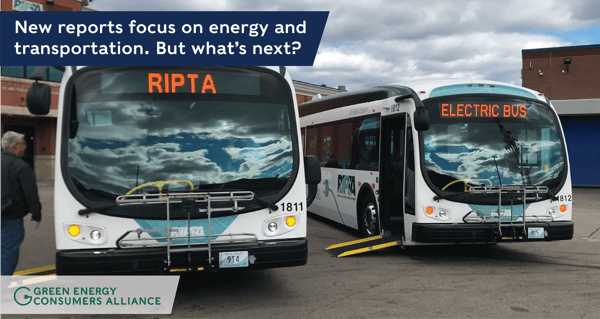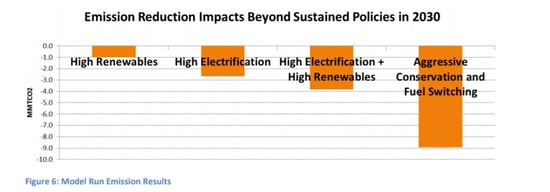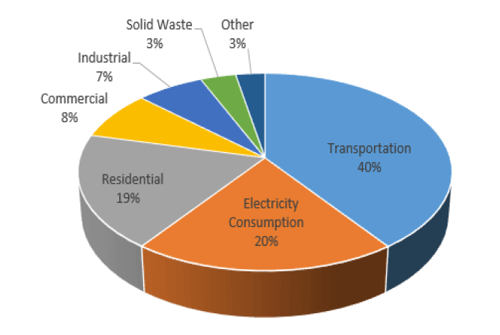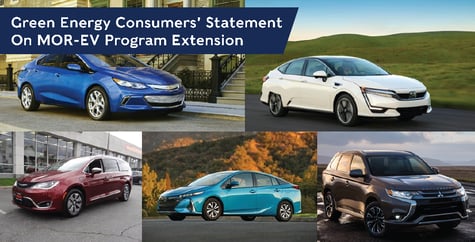 2018 is coming to a strong close for clean energy and climate policy in Massachusetts and Rhode Island. Within a few days, the Baker administration in Massachusetts released two major reports on the future of the state's energy and transportation systems, while Rhode Island kicked off development of its 20-year Transit Master Plan, and both states announced participation in the Transportation Climate Initiative (TCI), a nine-state regional commitment to address transportation sector emissions.
2018 is coming to a strong close for clean energy and climate policy in Massachusetts and Rhode Island. Within a few days, the Baker administration in Massachusetts released two major reports on the future of the state's energy and transportation systems, while Rhode Island kicked off development of its 20-year Transit Master Plan, and both states announced participation in the Transportation Climate Initiative (TCI), a nine-state regional commitment to address transportation sector emissions.
These plans and commitments have been a long-time in the making and will inform efforts to reduce greenhouse gas (GHG) emissions in the northeast going forward. Now, with a new year upon us, we must act on the recommendations made in the reports, develop policies, and implement programs that will move the needle on climate action.
MASSACHUSETTS: Comprehensive Energy Plan (CEP) & Commission on the Future of Transportation (CFT) Report
On December 12, the Baker Administration released its Comprehensive Energy Plan (CEP). The 213-page plan examines Massachusetts’ energy supply and expected demand for electricity, transportation, and heating sectors through 2030. The plan considers four scenarios that suggest how demand could be met and emissions, reduced. Conservation, energy efficiency, and demand reduction (including active demand response), increased renewable electricity supply, and transportation electrification are strategies considered in the scenario analyses.
However, only the fourth scenario, Aggressive Conservation & Fuel Switching, adequately reflects the levels of efficiency, conservation, and electrification necessary and capable of achieving compliance with the Massachusetts Global Warming Solutions Act (GWSA), let alone what is needed to combat climate change. Toward that end, the fourth scenario is really the only scenario that should guide policy creation and decision making going forward.
The CEP was produced for Massachusetts using Massachusetts-specific data. However, the modeling results are very applicable in a general way to Rhode Island and all the New England states.

Earlier this year, Governor Baker also convened a Commission on the Future of Transportation to identify challenges facing the state’s transportation system, including the need to reduce emissions from a sector where GHGs have been on the rise. Two days after the release of the CEP, the Commission released a two-part report (the Future of Transportation Report & Recommendations) outlining recommendations for how to address challenges in the next 20 years.
The transportation report frames 18 recommendations based on several key factors, including:
- a population that is aging and growing,
- the emergence of new technologies (electric vehicles),
- different needs and transportation uses for different communities,
- the need to mitigate inequity and to meet climate obligations.
Some of the challenges in one area, however, may provide a solution in others. For example, electrification of transportation can be disruptive, but also has the potential to increase mobility options, benefit public health by reducing air pollution, and contribute to GWSA compliance by significantly reducing GHGs from the transportation sector.
RHODE ISLAND: Transit Master Plan
Rhode Island may not have the same GHG emission reduction mandates that Massachusetts must adhere to, but it is under the same urgency to reduce greenhouse gas emissions. Several policies and upcoming reports have the potential to lead the state's energy/transportation sector forward - most notably, the Transit Master Plan (TMP) that is just getting underway.
Unlike MA's Future of Transportation Report & Recommendations, RI's TMP covers only public transit but should present a vision, specific improvements, funding sources, and policy recommendations for the state transit system through 2040. Over the two decades that the TMP will cover, Rhode Island’s transit must embrace electrification while increasing accessibility throughout the state. A strong Transit Master Plan that prioritizes reducing GHGs and lays out specific goals with benchmarks would help prepare the state for the significant changes needed by 2040.
Transit Master Plan may make up, in part, for the state’s lack of a plan to reduce emissions from the transportation and building sectors. Rhode Island currently has no direction on tackling emissions from transportation and buildings.

Rhode Island GHG emissions by sector
TRANSPORTATION CLIMATE INITIATIVE
Any plan to improve the transportation system needs a strategy to fund the improvements. Pricing carbon emissions, especially in the transportation sector, is one strategy for generating the resources needed to invest in infrastructure and to facilitate the transition of dirty transportation options. Regional coordination to develop a policy to collectively tackle transportation sector emission is one of the primary recommendations made in Massachusetts’ Future of Transportation’s report. It was no coincidence then, that Massachusetts and Rhode Island announced plans to join seven other states in the Transportation Climate Initiative, a regional cap-and-invest approach to reducing emissions from transportation fuels.
The Transportation Climate Initiative (TCI) promises to be the kind of action that the Massachusetts Future of Transportation Report and Comprehensive Energy Plan call for. However, it remains to be seen how the public commitment to design a policy translates to an implementable program with measurable results. For now, we’re in for at least a year of multi-state negotiations to develop a policy and considerably more time after that before the policy is fully put in place.
FROM RECOMMENDATIONS TO ACTION
 Policy Director Eugenia Gibbons testifying at December 18th oversight hearing of the Mass. Committee on Global Warming & Climate Change. In testimony, Eugenia encouraged legislators to pursue policy solutions that are bold, achievable, expeditious, and equitable.
Policy Director Eugenia Gibbons testifying at December 18th oversight hearing of the Mass. Committee on Global Warming & Climate Change. In testimony, Eugenia encouraged legislators to pursue policy solutions that are bold, achievable, expeditious, and equitable.
Neither the CEP nor the CFT report make clear how MA will implement the recommendations laid out in both. Although we laud the TCI commitments made last week, we are years from realizing the full impact. These advancements, though – comprehensive reports and public commitments made – inform action that is urgently needed and help to set the agenda for a robust policy process. The rest falls to the public and to advocates to hold decision-makers accountable for developing and implementing policies and programs capable of moving the needle on climate change.
As Massachusetts and Rhode Island continue along their emissions reduction pathways, Green Energy Consumers Alliance urges decision-makers to consider the following:
- Target setting matters. States must set stringent, binding emission reduction targets informed by current science. In Massachusetts, that discussion includes re-setting the 2050 GWSA mandate from 80% below 1990 levels to net zero and more importantly, it requires establishing corresponding interim targets. 2030 and 2040 targets are critical to ensuring that the Commonwealth is steadily progressing over time rather than relying on some silver bullet to emerge at the 11th hour. We support interim targets of 50% x 2030 and 75% by 2040. Rhode Island should adopt similarly ambitious mid-term targets and, for the first time, make the targets mandatory and enforceable.
- More clean energy is needed. Renewable generation will help to transform our electricity supply, reducing electric sector emissions and ensuring that when we plug in to achieve compliance in other sectors, we are powering our appliances and vehicles with wind, solar, and hydro.
- Energy Efficiency needs to be tripled…at least! Energy efficiency is our cheapest, most abundant energy source, yet each year both states fall woefully short of maximizing all that is available. In Massachusetts, the Comprehensive Energy Plan acknowledges the importance of electric energy efficiency, going so far as to call for a tripling of efficiency from Mass Save, building codes, and appliance standards.
- Tackling Transportation is Key. Adequate and sustained investment in public transit and low-emission transportation more generally is necessary if we are going to have any success in reducing overall emissions. As an immediate but short-term measure, we need to replenish funding for MOR-EV in Massachusetts and the DRIVE Rebate in Rhode Island. Longer-term, we need to incentivize EV adoption through electric rate-setting and building charging stations. EV-only electric rates and charging station availability is necessary, not just to support passenger cars, but electric buses, and other medium- and heavy-duty vehicles. TCI shows some long-term promise for funding progress in the transportation sector, but we have yet to see if it will be implemented with the necessary strength and urgency.

Read our statement on the MOR-EV Program Extension.
Green Energy Consumers will be working hard to pursue aggressive greenhouse gas reduction mandates, pass appliance standards, support targeted investments in weatherization and heat pump installations, and implement solutions that make electric vehicles and electric transportation accessible to all. Follow our progress here and on our advocacy page.
 2018 is coming to a strong close for clean energy and climate policy in Massachusetts and Rhode Island. Within a few days, the Baker administration in Massachusetts released two major reports on the future of the state's energy and transportation systems, while Rhode Island kicked off development of its 20-year Transit Master Plan, and both states announced participation in the Transportation Climate Initiative (TCI), a nine-state regional commitment to address transportation sector emissions.
2018 is coming to a strong close for clean energy and climate policy in Massachusetts and Rhode Island. Within a few days, the Baker administration in Massachusetts released two major reports on the future of the state's energy and transportation systems, while Rhode Island kicked off development of its 20-year Transit Master Plan, and both states announced participation in the Transportation Climate Initiative (TCI), a nine-state regional commitment to address transportation sector emissions.


Comments